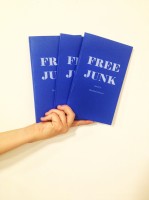 Free Junk
Free Junk
by Rachel Jensen
Snoot Books
$10 / Buy from Snoot Books
Perhaps the most recent tie between humor and gloom is the suicide of Robin Williams. Yet, the examples are plenty: comedian Mitch Hedburg—”My fake plants died because I did not pretend to water them,” was reported dead due to drug overdose; addiction invariably traces to depression. Sarah Silverman jokes about her ups and downs, “I am diagnosed with not having enough insanely-addictive drugs coursing through my body.” Maria Bamford, Google her. And Shakespeare, that guy, he divided his mojo between comedy and tragedy. I think of this waltz of contrasting sentiments when I read Rachael Jensen’s chapbook, Free Junk. Jensen’s poems can be comically-surreal and bearers of realistic insight. She provides details that make me want to laugh-weep. Ironic, romantic, yucky, naive, searching—she’s got as many voices as a self-help hotline on Valentine’s Day night.
For starters, Free Junk allows itself the liberty to be bizarre. Despite whatever “junk” the poems begin with, they have confidence that they will end up somewhere meaningful or at least where they need to go. Here is a list of first lines:
in a bush: Levi’s classic fit denim,
Once, a stranger sent me a message on the Internet
to tell me she dreamed I gave birth to a kitten. I responded,
I like marshmallows over an open flame.
I heard ‘toaster dream’
We begin with found, odd and banal things, sometimes misunderstandings. Whatever the particular point of entry, the peculiarity is fetching. I am intrigued to see where the poem could go, and Jensen manages to find her way: classic fit Levi’s washed and dried throughout the night become a drunken loneliness, self-satisfied and clad in “victim shorts”; an internet message about cat-birthing yields cat-water-holding which funnels into an inquiry regarding the nature of a priori knowledge. I think of another recently-dead person, Russell Edson, his surreal miniature fables. I also remember what a classmate told me once during a workshop: “It’s hip to include whatever you can in a poem.” That lady was right; it is hip to include gallbladder stuffed animals in poems, but as Mitch Hedburg once postulated, “Is a hippopotamus a hippopotamus, or just a really cool Opotamus?” Free Junk has the opotamus, too. The chapbook engages with the trend, but the poems are grounded by their odd specificity and drift into profundity.
Free Junk plays with romance, too. It romances, playfully. There is a brunette lament:
The brunettes love Anna Karina because she is rude
but people find this interesting.
A blonde lament:
The blondes love Brigitte Bardot, because she is pouty
but people find this desirable.
If laments originate from poems like Beowulf or, as the internet explains, The Hindu Vedas, even the Christian Old Testament, texts of “great feeling,” then certainly these laments are ironic. They are first-world-problem laments. Funny, too, because they are astute observers of their lamentables; despite their ridiculousness, they also make sense. Smart. There are various other hyperbolized, ironic-romantic moments throughout the chapbook, poems that seem to serve as the comedic lens through which Jensen examines entitlement and suffering.
The shift from comedic to tragic occurs gradually throughout the chapbook. The first poem is titled: “White girl, do you know about pain?” The poem responds: “Not much, but I am learning a little.” A modest beginning, but later, articulations of pain echo Sylvia Plath, sometimes via Dorothea Lasky, sometimes Pure Plath. From “White dog, do you know about pain?”:
won’t do them because the tail follows the dog everywhere
and here you are, gutting fish skimmed from a hatchery
like calf from a killing pool. They had No Chance.
Your greed glistening on tinfoil: fish viscera, pain ramen.
If there is a visual for youthful apathy, this is it—
all the while, dust everywhere. Dog shit confettied with crayon
drying in the side yard, brown-black and bright.
Because you see the dog, really see the dog—her white brain
running leashed—your heart bleeds, and you set her free.
Then the dog’s mom dies, and that means gone, so she
sleeps with a blue pen near her face. She wakes
with a chore list on her cheeks—trance-writing from a dream
where mom appears, licks her clean, then leaves.
The precision of the images, their violence, expresses a mourning that is both guilty and unabashed. The mother dies and she dies in many of these poems. This death appears as both a concept and an autobiographical event, a confession. I admire that Jensen writes at this register, that despite her deftness at comedy and absurdity she also gives mourning its due. I also wonder what a more furious expression of her pain would look like.
I’ll keep returning to Free Junk and look forward to new work by Rachael Jensen. She is a talented writer, juggler and graveundigger.
***
Sara Sutter wrote a chapbook, Sirenomelia, published by Poor Claudia. Other works appear in The Awl, Fence, Propeller, The Sentimentalist and various fine venues.
Tags: Free Junk, Rachel Jensen
